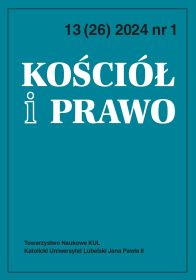The Religious Basis of Contemporary Law
The Religious Basis of Contemporary Law
Author(s): Michał NajmanSubject(s): Law, Constitution, Jurisprudence, Canon Law / Church Law
Published by: Towarzystwo Naukowe KUL & Katolicki Uniwersytet Lubelski Jana Pawła II
Keywords: law; religion; religious basis of law
Summary/Abstract: Religion and law intermingled and influenced each other both in the early stages of the formation of society and in the subsequent processes of its development. It is impossible to say unequivocally which of the two developed earlier or which had a greater influence on the modern form of the other. Today, questions concerning the relationship between law and religion are rarely the subject of research. The prevailing view that proclaims the secularisation of law, while undoubtedly justified, seems to overlook the religious origins of many modern secular institutions of law, such as, equality before the law, social policy, parental authority or the posthumous protection of human corpses and graves. As it seems, the move away from religious justification of legal institutions is a valid solution, prompting legal scholarship to seek explanations for the functioning of the legal system. The purpose of this article is to point out that law and religion intermingled in the creation of their final forms, resulting in the spread of legal institutions derived from norms of a religious nature. This encourages the creation (or denotation) of legally protected values and the search for their scientific (non-religious) basis.
Journal: Kościół i Prawo
- Issue Year: 13/2024
- Issue No: 1
- Page Range: 89-102
- Page Count: 14
- Language: English

